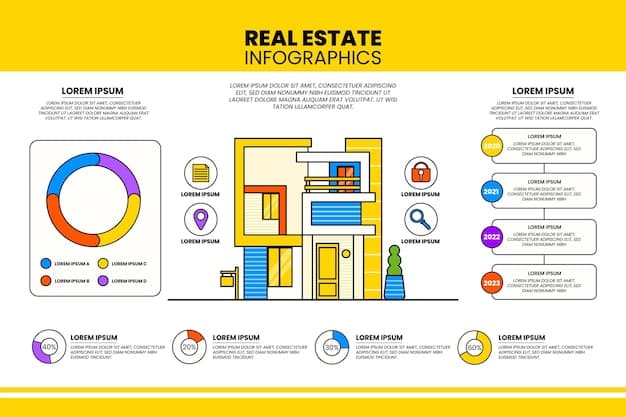Estate Planning 2025: Minimize Taxes & Protect Your Assets

Estate Planning in 2025 requires proactive strategies to minimize estate taxes and ensure your assets are protected for future generations, considering evolving tax laws and financial landscapes.
Navigating the complexities of estate planning can seem daunting, but with careful preparation and the right strategies, you can effectively minimize estate taxes and protect your assets for future generations. Let’s explore how to approach estate planning in 2025 with a focus on proven techniques and forward-thinking approaches.
Understanding the Essentials of Estate Planning
Estate planning is more than just creating a will; it’s a comprehensive process that ensures your assets are distributed according to your wishes while minimizing taxes and potential legal challenges. Thinking about estate planning in 2025 means reviewing existing plans and adapting them to current laws and personal circumstances.
This involves making critical decisions about who will inherit your assets, how they will receive them, and when. Additionally, it encompasses strategies for managing your assets during your lifetime if you become incapacitated.
Key Components of an Estate Plan
A well-rounded estate plan typically includes several essential documents and strategies.
- Will: A legal document outlining how your assets should be distributed after your death.
- Trusts: Legal arrangements that allow you to transfer assets to a trustee, who manages them on behalf of beneficiaries.
- Power of Attorney: Grants someone the authority to act on your behalf in financial and legal matters if you become unable to do so.
- Healthcare Directive: Outlines your wishes regarding medical treatment if you are unable to communicate them yourself.
Having these components in place ensures your wishes are respected and your assets are handled efficiently.

Effective Strategies for Minimizing Estate Taxes
One of the primary goals of estate planning is to minimize the impact of estate taxes. Understanding current tax laws and utilizing effective strategies can significantly reduce your tax burden. As we move toward estate planning in 2025, it is important to stay informed about potential changes in tax legislation that may affect your strategies.
Here are some strategies to consider:
Utilizing the Estate Tax Exemption
The federal estate tax exemption allows you to transfer a certain amount of assets to your heirs tax-free. Keeping up to date with exemption amounts is important for effective planning.
Gifting Strategies
Gifting assets during your lifetime can reduce the value of your estate subject to estate taxes. The annual gift tax exclusion allows you to gift a certain amount each year without incurring gift tax.
- Annual Exclusion Gifts: Utilize the annual gift tax exclusion to make regular gifts to family members.
- 529 Plans: Contribute to 529 education savings plans for grandchildren, effectively removing assets from your estate.
- Irrevocable Life Insurance Trust (ILIT): Establish an ILIT to hold life insurance policies, keeping the proceeds out of your taxable estate.
These gifting strategies can contribute to significant tax savings over time.
Leveraging Trusts for Asset Protection and Control
Trusts are powerful tools for managing and protecting your assets, providing both flexibility and control over how your assets are distributed. For estate planning in 2025, understanding the different types of trusts is essential to choose the best options for your specific needs.
Trusts offer various benefits, including:
Revocable Living Trusts
A revocable living trust allows you to maintain control over your assets during your lifetime while avoiding probate after your death. You can modify or terminate the trust at any time.
Irrevocable Trusts
Irrevocable trusts offer greater asset protection and tax benefits, as assets transferred into the trust are generally protected from creditors and estate taxes. However, these trusts cannot be easily modified or terminated.
- Qualified Personal Residence Trust (QPRT): Transfer your home into a QPRT to remove it from your estate while continuing to live in it.
- Grantor Retained Annuity Trust (GRAT): Transfer assets into a GRAT, receiving an annuity payment for a set period, with the remainder passing to your beneficiaries tax-free.
Choosing the right type of trust depends on your individual circumstances and goals.

The Role of Life Insurance in Estate Planning
Life insurance can play a crucial role in estate planning, providing a source of liquidity to pay estate taxes, cover debts, and provide financial support to your heirs. In the context of estate planning in 2025, it is important to reassess your life insurance needs and ensure your policies align with your overall estate plan.
Life insurance offers numerous benefits within estate planning:
Paying Estate Taxes
Life insurance proceeds can be used to cover estate taxes, preventing your heirs from having to sell assets to pay the tax bill.
Providing Liquidity
Life insurance provides immediate liquidity, which can be used to pay off debts, cover funeral expenses, and provide financial support to your family.
There are a couple of types of Life Insurance to consider:
- Term Life Insurance: Coverage for a specific period, often the most affordable option.
- Permanent Life Insurance: Lifelong coverage that also builds cash value.
Incorporating life insurance into your estate plan ensures your family is financially secure and prepared for the future.
Navigating Incapacity Planning: Power of Attorney and Healthcare Directives
Incapacity planning is an essential part of estate planning that addresses what happens if you become unable to manage your affairs due to illness or injury. As we look towards estate planning in 2025, having a plan in place for incapacity is crucial to ensure your wishes are respected and your affairs are handled smoothly.
Incapacity planning involves:
Durable Power of Attorney
A durable power of attorney allows you to appoint someone to manage your financial and legal affairs if you become incapacitated. This document remains in effect even if you become mentally incompetent.
Healthcare Directive (Living Will)
A healthcare directive, also known as a living will, outlines your wishes regarding medical treatment if you cannot communicate them yourself. It allows you to specify the types of medical treatments you want to receive or refuse.
Consider the following factors when drafting your Power of Attorney and Healthcare Directive:
- Choosing the Right Agent: Select someone you trust and who understands your values and wishes.
- Regular Review: Periodically review your documents to ensure they still reflect your current wishes and circumstances.
Having these documents in place ensures your affairs are managed according to your wishes if you become incapacitated.
Regularly Reviewing and Updating Your Estate Plan
Estate planning is not a one-time task; it requires regular review and updates to ensure it remains aligned with your current circumstances, goals, and changes in tax and legal laws. In the context of estate planning in 2025, it is important to establish a schedule for reviewing your estate plan and making necessary adjustments.
Regular review helps to:
Life Changes
Significant life events, such as marriage, divorce, birth of a child, or death of a loved one, can impact your estate plan and necessitate changes.
Tax Law Changes
Tax laws can change frequently, and these changes can affect the effectiveness of your estate planning strategies. Regularly reviewing your plan allows you to adapt to new tax laws and optimize your tax savings.
- Annual Review: Conduct an annual review of your estate plan to identify any necessary updates or changes.
- Professional Consultation: Consult with an estate planning attorney or financial advisor to stay informed about changes in tax laws and best practices.
By regularly reviewing and updating your estate plan, you can ensure it continues to meet your needs and protect your assets for future generations.
| Key Point | Brief Description |
|---|---|
| 📝 Comprehensive Plans | Go beyond wills; include trusts, powers of attorney, and healthcare directives. |
| 🎁 Gifting Strategies | Use exclusions, 529 plans, and ILITs to reduce estate value. |
| 🛡️ Trusts Utilization | Employ living and irrevocable trusts for asset control. |
| 🏥 Incapacity Plans | Prepare for unforeseen health issues with POA ,healthcare directives |
Frequently Asked Questions (FAQ)
▼
The first step is assessing your assets and liabilities to determine the scope of your estate. This helps you understand what needs to be protected and how to distribute it effectively.
▼
You should review your estate plan at least annually or whenever there are significant life changes, such as marriage, divorce, birth of a child, or changes in tax laws.
▼
Trusts can help avoid probate, provide asset protection, and allow for more control over how and when your assets are distributed to your beneficiaries.
▼
A power of attorney is a legal document that allows you to appoint someone to act on your behalf in financial and legal matters if you become unable to do so yourself.
▼
Life insurance can provide liquidity to pay estate taxes, cover debts, and provide financial support to your heirs, ensuring they are financially secure after your passing.
Conclusion
Estate planning in 2025 requires a proactive and informed approach to minimize estate taxes and protect your assets for future generations. By understanding the essentials of estate planning, utilizing effective tax-minimization strategies, leveraging trusts, incorporating life insurance, and planning for incapacity, you can create a comprehensive plan that aligns with your goals and provides peace of mind.





